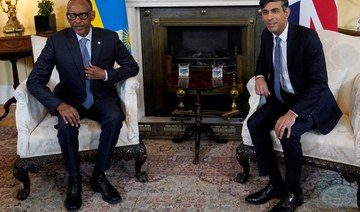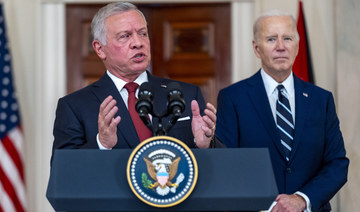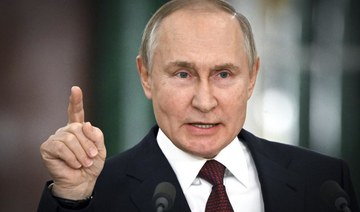PITTSBURGH: Federal prosecutors added more charges against the man accused of killing 11 Jews in a Pittsburgh synagogue, according to an indictment filed on Wednesday, as the city held funerals for three more victims.
Eleven worshipers were gunned down on Saturday morning by a man who stormed into the Tree of Life Synagogue and opened fire, yelling anti-Semitic statements including: “All Jews must die.”
The attack, believed to be the deadliest against Jews in the United States in recent history, has fueled a fierce political debate about white nationalism and anti-Semitism ahead of hotly contested US congressional elections next week.
Mourners gathered for the funerals of Melvin Wax, 88, who was leading Sabbath services when the attack began; retired real estate agent Irving Younger, 69; and retired university researcher Joyce Fienberg, 75.
The aftermath of the tragedy still pervaded life in the Squirrel Hill neighborhood where the synagogue is located.
In coffee shops, customers talked about the victims they knew, remembering them as civic-minded, kind and pillars of the community. In the street, friends embraced and comforted one another during the period of raw grief.
Libby Zal said that Younger was such a fixture in Squirrel Hill that a local store he frequented would send him a “get well” card if he did not appear after three days.
Dan Frankel, a Democratic member of the Pennsylvania House of Representatives, called Younger outgoing and opinionated.
“He was very interested in social justice and he probably would not have wanted the death penalty (for the gunman),” Frankel said.
A grand jury voted to indict Bowers on 44 counts, according to a filing in federal court in Pittsburgh. He had faced 29 counts.
The new charges included 11 counts of obstruction of free exercise of religious beliefs resulting in death, and various charges related to his use of a gun in anti-religious violence.
Prosecutors have said they will seek the death penalty.
The synagogue attack has heightened a national debate over Republican US President Donald Trump’s rhetoric, which critics say has contributed to a surge in white-nationalist and neo-Nazi activity. His administration denies he has encouraged far-right extremism and is instead attempting to unify America.
Amid the first funerals for victims on Tuesday, Trump visited Tree of Life. Thousands protested his presence in the city, accusing him of using rhetoric that has fueled anti-Semitism in America.
Several thousand protesters, an ethnically mixed crowd of all ages, held an anti-Trump rally about a block away from the synagogue just as his visit began, singing Old Testament psalms and carrying signs with such slogans as: “We build bridges not walls.”
Trump made no public comments during his visit, but wrote on Twitter on Wednesday morning that his office had been “shown great respect on a very sad and solemn day” in Pittsburgh.
“Small protest was not seen by us, staged far away,” he tweeted. “The Fake News stories were just the opposite-Disgraceful!“
More than 1,800 people paid their respects on Tuesday at Rodef Shalom, another synagogue in Squirrel Hill, the heart of the city’s Jewish community.
Trump’s visit to Pennsylvania’s second largest city came seven days before elections that will determine whether his Republican Party maintains control of both houses of Congress or whether the Democrats seize a majority in one chamber or both.
The accused gunman in the synagogue attack, Robert Bowers, was charged on Monday with 29 federal felony counts including hate crimes.
Four days after the attack, nerves in Squirrel Hill were still frayed. A public school was briefly placed on lockdown following a report that someone had brought a gun onto campus, police said. The report was later found to be false.
Jodi Smith, a Pittsburgh native, joined mourners ahead of the Wax funeral at the Ralph Schugar Chapel and remembered him as a “very polite, gentle man.”
“I could have claimed him as a father,” Smith said. “He was always at the synagogue, always helping out. The synagogue had been his life since his wife passed away a few years ago.”
Fienberg spent 25 years as a researcher at the University of Pittsburgh’s Learning Research and Development Center until she retired in 2008.
“She was an engaging, elegant, and warm person,” the center said on Facebook.
Pittsburgh synagogue shooting suspect charged with 44 counts
Pittsburgh synagogue shooting suspect charged with 44 counts
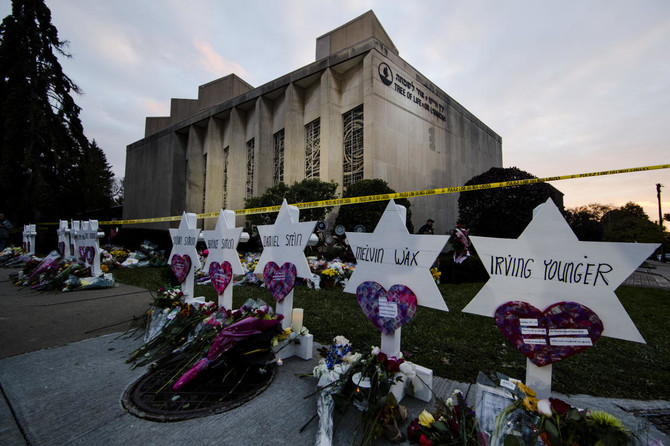
- Eleven worshipers were gunned down on Saturday morning by a man who stormed into the Tree of Life Synagogue and opened fire
- A grand jury voted to indict the suspect on 44 counts
Philippines rules out use of water cannon in disputed South China Sea

- Philippines and China have clashed several times in disputed, resource-rich waterway
- Latest skirmish took place late last month, in an incident Manila describes as dangerous
MANILA: President Ferdinand Marcos Jr. said on Monday that Manila will not use offensive equipment in the disputed South China Sea, after China’s coast guard used high-pressure water cannon on Philippine vessels last week.
The Philippines and China have had several confrontations in the resource-rich area, where Beijing has used water cannon against Filipino vessels in incidents Manila has described as harassment and dangerous.
The latest in a string of maritime clashes occurred on April 30 as tensions continued to rise in the vital waterway that Beijing claims almost in its entirety despite a 2016 international arbitration ruling that rejected its assertion.
“What we are doing is defending our sovereign rights and our sovereignty in the West Philippine Sea. And we have no intention of attacking anyone with water cannons or any other such offensive (weapons),” Marcos said Monday.
“We will not follow the Chinese coast guard and the Chinese vessels down that road because it is not the mission of the navy (or) our coast guard to start or to increase tensions … Their mission is precisely the opposite, it’s to lower tensions.”
Philippine vessels have been regularly targeted by Chinese ships in areas of the South China Sea that are internationally recognized as belonging to the Philippines, which Manila calls the West Philippine Sea.
The Philippines’ Ministry of Foreign Affairs last Thursday summoned Zhou Zhiyong, China’s deputy chief of mission, after the incident left a Philippine coast guard vessel and another government boat damaged.
It was the 20th protest Manila has made against Beijing’s conduct in the South China Sea this year alone, while more than 150 diplomatic complaints have been made over the past two years.
Marcos said the Philippines will continue to respond to South China Sea incidents through diplomatic means.
Marcos’s statement comes days after the defense ministers of the Philippines, the US, Japan and Australia met in Hawaii and issued a joint statement on their strong objections to the “dangerous and destabilizing conduct” of China in the South China Sea.
UK considered Rwanda-style asylum deal with Iraq
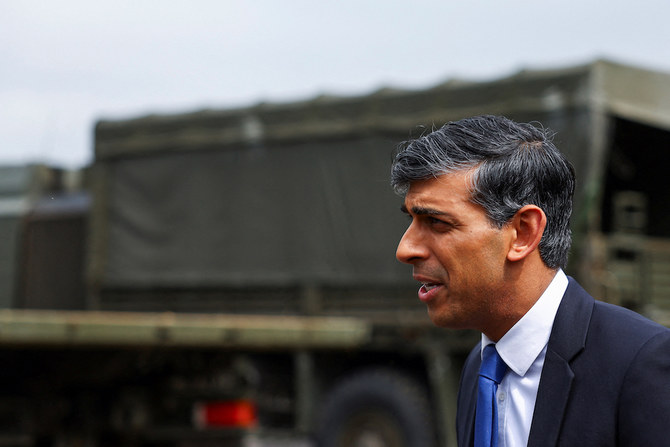
- Documents seen by Sky News reveal London has struck returns agreement with Baghdad
- They also suggest a desire to improve relations with Iran to return people to the country
LONDON: The UK considered sending asylum-seekers to Iraq for processing, new documents have shown.
Iraq is considered very dangerous, with the UK government advising against all travel to the country.
But a plan similar to the Rwanda scheme to process migrants in a third-party country was floated at one stage by Whitehall officials, with negotiations said to have achieved “good recent progress.”
The UK has struck a returns agreement with Baghdad for Iraqi citizens, which was achieved without a formal announcement or acknowledgement and a plea for “discretion,” the documents, seen by Sky News, suggest.
The cache of papers casts new light on the UK government’s approach to dealing with asylum-seekers and illegal migration, including a desire to improve relations with the Iranian Embassy in London in order to ease the repatriation of Iranian citizens, and moves to establish return agreements with Eritrea and Ethiopia.
Biden meets Jordan’s King Abdullah as Gaza ceasefire hopes dim
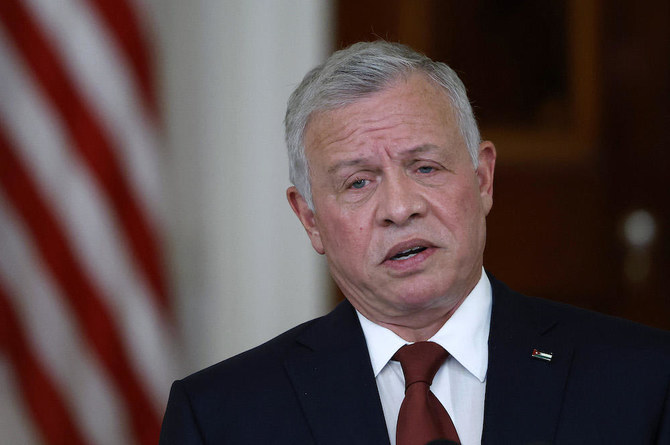
- Monday’s meeting between two leaders is not a formal bilateral meeting but an informal private meeting
- US president Biden faces increasing pressure politically to convince Israel to hold off on an invasion
WASHINGTON: President Joe Biden will meet Middle East ally, Jordan’s King Abdullah II, at the White House on Monday with prospects for a Gaza ceasefire appearing slim and Palestinian Islamist group Hamas and Israeli officials blaming each other for the impasse.
On Sunday, Hamas reiterated its demand for an end to the war in exchange for the freeing of hostages, and Israeli Prime Minister Benjamin Netanyahu flatly ruled that out. Hamas also attacked the Kerem Shalom crossing into Gaza that Israel said killed three of its soldiers.
A Jordanian diplomat said Monday’s meeting between Biden and King Abdullah is not a formal bilateral meeting but an informal private meeting. It comes as the Biden administration and Israeli officials remain at odds over Israel’s planned military incursion in Rafah.
Biden last met King Abdullah at the White House in February and the two longtime allies discussed a daunting list of challenges, including a looming Israeli ground offensive in southern Gaza and the threat of a humanitarian calamity among Palestinian civilians. Jordan and other Arab states have been highly critical of Israel’s actions and have been demanding a ceasefire since mid-October as civilian casualties began to skyrocket. The war began after Hamas stunned Israel with a cross-border raid on Oct. 7 in which 1,200 people were killed and 252 hostages taken, according to Israeli tallies.
Biden last spoke to Netanyahu on April 28 and “reiterated his clear position” on a possible invasion of the Gaza border city of Rafah, the White House said. The US president has been vocal in his demand that Israel not undertake a ground offensive in Rafah without a plan to protect Palestinian civilians.
With pro-Palestinian protests erupting across US college campuses, Biden faces increasing pressure politically to convince Israel to hold off on an invasion. Biden addressed the campus unrest over the war in Gaza last week but said the campus protests had not forced him to reconsider his policies in the Middle East.
Russia’s president Putin orders nuclear drills with troops near Ukraine
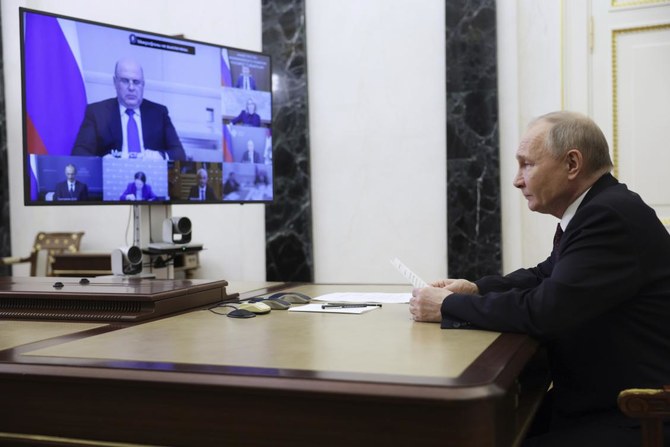
- Putin has upped his nuclear rhetoric since the Ukraine conflict began, warning in his address to the nation in February there was a ‘real’ risk of nuclear war
MOSCOW: President Vladimir Putin has ordered the Russian military to hold nuclear weapons drills involving the navy and troops based near Ukraine, the defense ministry said Monday.
Putin has upped his nuclear rhetoric since the Ukraine conflict began, warning in his address to the nation in February there was a “real” risk of nuclear war.
“During the exercise, a set of measures will be taken to practice the preparation and use of non-strategic nuclear weapons,” the defense ministry said.
Non-strategic nuclear weapons, also known as tactical nuclear weapons, are designed for use on the battlefield and can be delivered via missiles.
The ministry said the exercises would take place “in the near future” and were aimed at ensuring Russia’s territorial integrity in the face of “threats by certain Western officials.”
Aircraft and naval forces will take part, as well as troops from the Southern Military District, which borders Ukraine and includes the occupied Ukrainian territories, it said.
Western officials have become increasingly alarmed by the Kremlin’s nuclear rhetoric during the offensive in Ukraine, with Putin frequently invoking Russia’s nuclear doctrine.
Last year Russia ditched its ratification of the Comprehensive Nuclear Test Ban Treaty and pulled out of a key arms reduction agreement with the United States.
No place to pray for Muslim workers in Italian city

- Urban planning regulations tightly limit the establishment of places of worship, mayor says
- Islam is not among the 13 religions that have official status under Italian law
MONFALCONE, Italy: It’s Friday prayers in the northeastern Italian city of Monfalcone, and hundreds of men are on their knees in a concrete parking lot, their heads bowed to the ground.
They are just a fraction of the city’s Muslims who since November have been banned from praying inside their two cultural centers by Monfalcone’s far-right mayor.
Instead, they assemble in this privately owned construction site as they await a court decision later this month to settle a zoning issue they say has barred their constitutional right to prayer.
Among them is Rejaul Haq, the property’s owner, who expresses frustration over what he and many other Muslims see as harassment by the city they call home.
“Tell me where I should go? Why do I have to go outside of Monfalcone? I live here, I pay taxes here!” lamented Haq, a naturalized Italian citizen who arrived from Bangladesh in 2006.
“Catholics, Orthodox, Protestants, Jehovah’s, if they all have their church — why can’t we have one?”
Immigrants make up a third of this city of 30,000 inhabitants outside Trieste, most of them Bangladeshi Muslims who began arriving in the late 1990s to build cruise-liners for ship builder Fincantieri, whose Monfalcone shipyard is Italy’s largest.
Their presence is immediately visible, whether the Bangladeshi men on bicycles peddling to and from work or the ethnic grocery stores on street corners.
For Mayor Anna Cisint, the restriction on prayer is about zoning, not discrimination.
Urban planning regulations tightly limit the establishment of places of worship, and as a mayor in a secular state, she says it is not her job to provide them.
“As a mayor, I’m not against anybody, I wouldn’t even waste my time being against anybody, you see, but I’m also here to enforce the law,” Cisint said.
Still, she argues the number of Muslim immigrants, boosted by family reunifications and new births, has become “too many for Monfalcone.”
“There are too many... you have to tell it like it is,” she said.
Her warnings about the “social unsustainability” of Monfalcone’s Muslim population have propelled Cisint to national headlines in recent months.
They have also assured her a spot in upcoming European Parliament elections for Matteo Salvini’s anti-immigrant League party, part of Prime Minister Giorgia Meloni’s coalition government.
The League for decades has obstructed mosque openings in its stronghold of northern Italy. But the problem is nationwide in Catholic-majority Italy.
Islam is not among the 13 religions that have official status under Italian law, which complicates efforts to build places of worship.
There are currently fewer than 10 officially recognized mosques, said Yahya Zanolo of the Italian Islamic Religious Community (COREIS), one of the country’s main Muslim associations.
That means that out of Italy’s estimated more than two million Muslims, most are relegated to thousands of makeshift places of worship that “feed prejudice and fear in the non-Muslim population,” said Zanolo.
Cisint, who has been under police protection since receiving online death threats in December, complains about a resistance to integration by what she called a “very closed” community.
She asks why Arabic and not Italian is taught in the community centers and calls “intolerable” wives walking behind husbands or schoolgirls in veils.
In the run-up to European elections, the League has once again seized on illegal immigration to Italy — where nearly 160,000 migrants arrived by boat last year, mostly from Muslim countries — as a vote-winner.
Salvini has called the June vote “a referendum on the future of Europe,” to decide “whether Europe will still exist or whether it will be a Sino-Islamic colony.”
But Monfalcone’s Muslims don’t fit the stereotypes exploited by the League, armed as they are with work permits or passports.
“It’s not like we came here to see the beautiful city of Monfalcone,” jokes Haq. “It’s because there’s work here.”
Many Muslims said they feel a palpable sense of distrust, if not outright hatred, from some of the long-time residents.
Ahmed Raju, 38, who works at Fincantieri installing panels, has mostly prayed at home since the cultural centers have been off-limits.
Such is the reach of the mayor’s rhetoric that “even I get scared” about Muslims, Raju said.
Of the prejudice the community faces, Raju added: “You feel like you’re in front of a big wall, that you can’t break down.”
“We’re foreigners. We can’t change the situation.”
Outside a classroom where volunteers teach Italian to recently immigrated women, Sharmin Islam, 32, said the animosity is acutely felt by her young son who was born in Italy.
“He comes back from school and asks, ‘Mum, are we Muslims bad?’”
An administrative court in Trieste will rule on May 23 whether to uphold or strike down the mayor’s ban on prayer within the cultural centers.
Haq says Monfalcone’s Muslims have “no Plan B” if they lose, but worries even if they win the scars from the stand-off will remain.
Meanwhile Cisint has been actively promoting her book, “Enough Already: Immigration, Islamization, Submission,” warning Monfalcone’s situation could be duplicated elsewhere.
On a recent public holiday, Bangladeshis filled the city’s main square, from little girls with unicorn balloons to groups of young men enjoying a day off.
Looking on was barman Gennaro Pomatico, 24.
“The locals won’t ever accept them,” said Pomatico.
“But ultimately they don’t bother anyone.”





